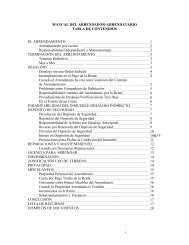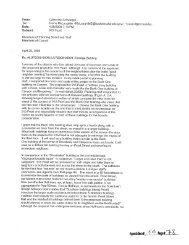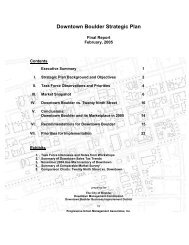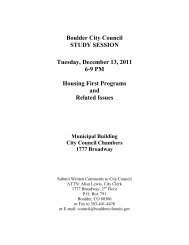Suzy Ageton George Karakehian KC Becker Tim ... - City of Boulder
Suzy Ageton George Karakehian KC Becker Tim ... - City of Boulder
Suzy Ageton George Karakehian KC Becker Tim ... - City of Boulder
You also want an ePaper? Increase the reach of your titles
YUMPU automatically turns print PDFs into web optimized ePapers that Google loves.
The YOP fosters strong community relationships, which research has shown to serve as a<br />
protective factor for youth <strong>of</strong> color. This increased resiliency supports increased high school<br />
graduation rates, improved earnings potential, less involvement with law enforcement, and<br />
increased self-sufficiency.<br />
BACKGROUND<br />
The Youth Opportunities Fund was established after passage <strong>of</strong> the 0.15 percent sales and use tax<br />
in 1992. Eight percent <strong>of</strong> the funds collected through this tax were allocated for the Youth<br />
Opportunities Fund. In 2009, a ballot initiative extended the 0.15 percent sales and use tax<br />
indefinitely and without restriction to continue “to fund, without limitation, fire, police, library,<br />
parks, human services, and other general fund purposes.”<br />
The YOP's mission is to strengthen the community through empowering youth, providing<br />
enrichment opportunities for youth, encouraging youth civic participation and community<br />
service, and advising city government. Funds are allocated each year to provide cultural and<br />
educational opportunities for city resident middle and high school age youth. Measures are taken<br />
to ensure there are no duplications with funding from the city’s Human Services Fund.<br />
Using guidelines and priorities identified in the Housing and Human Services Master Plan and<br />
the Social Sustainability Strategic Plan, the YOP has identified the following focus areas to<br />
address community needs. Annual grant applicants all addressed at least one <strong>of</strong> these areas:<br />
• Address key issues identified in the Youth Risk Behavior Survey results, for example:<br />
mental health, substance use, harassment, health disparities based on sexual orientation or<br />
ethnicity, etc.;<br />
• Promote youth voice by engaging youth in structured aspects <strong>of</strong> civic life and/or in<br />
community dialogue on social issues;<br />
• Provide after-school, evening, and/or summer opportunities that likely would not<br />
otherwise be available to youth;<br />
• Provide services particularly to middle school or Latino youth;<br />
• Provide transportation to help youth access cultural, educational or recreational<br />
opportunities or employment;<br />
• Provide employment-related education opportunities for youth; and<br />
• Support city-sponsored after-school activities.<br />
The priority for all Youth Opportunities Fund funding is to support programs serving youth who<br />
are low-income, youth who are immigrants or youth with disabilities/who are differently-abled.<br />
ANALYSIS:<br />
Fifteen annual grant proposals totaling $174, 881, were received in 2011. Nine <strong>of</strong> those<br />
proposals requested two-year grants. Thirteen proposals were funded either fully or partially for<br />
one year, totaling $153,008. Combined with the $31,952 allocated for two years in the 2010<br />
process, a total <strong>of</strong> $184,960 will be distributed in the 2011-2012 academic year. Two-year grant<br />
funds allocated in 2011 will result in $42,834 for three agencies in 2012-2013. The total amount<br />
allocated in 2011 is $195,842.<br />
Information Item 2A Page 2















